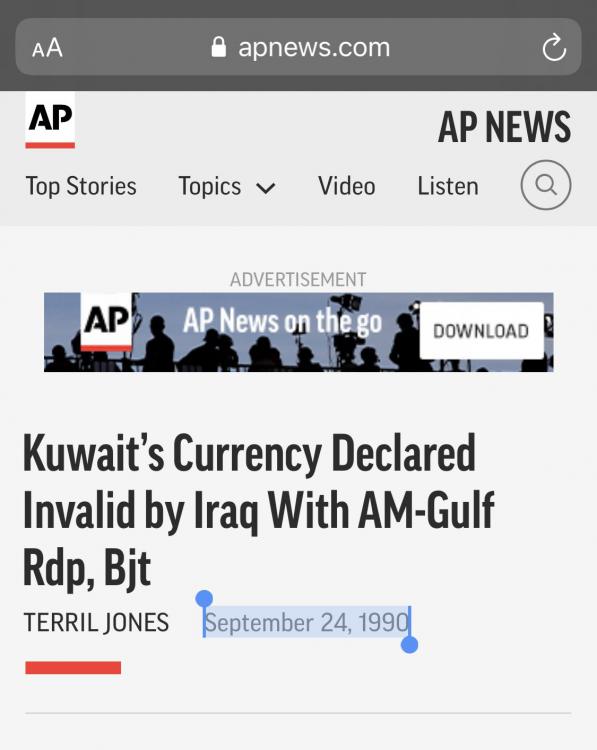
|
-
Posts
753 -
Joined
-
Last visited
Content Type
Gallery
Forums
Calendar
Store
Musicbox
Posts posted by Ziggy
-
-
-
5 hours ago, Adam Montana said:
You're VIP!" rel="">VIP, buddy - you would have had a much different notification

The downtime was unfortunate but in over a decade, we have never had an issue like this - I am confident the site functionality will be restored to 100% within about a week.
In the meantime, the most important things are safe. We had some downtime, but 0 security breaches occurred, ZERO losses were maintained, and besides the slight inconvenience we all had... ZERO negative effects happened.
We may have a little more downtime, but at this point I hope everyone will trust and be patient.
If not...



Glad to hear you’re doing well. Thank you for the update Adam…Very much appreciated 👍
-
 2
2
-
 2
2
-
-
@Adam Montana
Adam, thank you for everything that you and your team have done over the years and continue to do for the DV Fam!
I have a support ticket out there right now as well. Life has thrown some curves this year, but I’m looking forward to the day when we can all celebrate!
-
 1
1
-
 1
1
-
-
-
20 minutes ago, yota691 said:
IMF SDR & DIGITAL TRANSFORMATION UNDERWAY! XRP PRICE GEARING UP FOR A BULLISH BREAKOUT!
16,942 viewsAug 23, 2021
The digital era is upon us and it’s still the ground floor for investing in this new reality that we will all live in. I could talk about XRP for a long long time in regards to how this one crypto will revolutionize the world that we live in. Everyone that is on this site. VIP & Non VIP members. Do yourselves and your family a favor and invest in this crypto! Generational wealth - life changing wealth will be generated from Crypto; but XRP will be one of the few that will bring about life changing wealth.
Think about where you would be right now if you owned Amazon, Coca Cola, Tesla, Apple, Google etc. stock when they first launched. You probably wouldn’t be here reading this right now.
Crypto is literally at the ground floor and getting ready to be globally adopted.
The Crypto market that we are currently in is about to make some serious returns. The type of technology that is transpiring in the world right now is absolutely mind blowing.
The world is about to see the fourth industrial revolution, and it’s going to revolutionize the financial world.
The technology that we currently use in the world of finance is old antiquated technology, and is extremely outdated compared to what currently exist today with crypto currency and blockchain technology.
The world is moving faster and faster into the digital age. We went from home phones that used to have 10-20 feet of wire attached to it - to now holding all of the worlds knowledge in the palm of our hands through a cell phone.
That type of change that we have lived through, with the old type of technology for phones - is about to occur within the world of finance.
Currently, to process a wire transfer from one financial account to another is a period of 24 hours and sometimes up to 48 hours for clearing purposes. That is all about to change.
A wire transfer using blockchain technology will make the old 24 hour transaction occur in under 9 seconds and faster.
The original price for Bitcoin when it launched in 2009, compared to what it is right now is mind blowing. You were looking at pennies on the dollar back then per coin, compared to $49,000 today per coin.
BUT
This is just my two

-
 4
4
-
 2
2
-
 1
1
-
 1
1
-
-
2 hours ago, coorslite21 said:
Central Bank of Iraq
As-it-happens update ⋅ August 23, 2021WEB
file-162607942971064.pdfThe central bank of Iraq, which was established in (1947), is one of the most important institutions of the Iraqi state, as it managed the monetary policy ...Great post CL! Thank you
-
 1
1
-
-
Thought this ☝️ was a good read and wanted to bring it over to the general board as well as VIP. Keeping an eye on what Iraq is doing in the digital space can be valuable information.
Blessings,
Ziggy
-
 3
3
-
 2
2
-
-
https://www.google.com/amp/s/www.coindesk.com/crypto-iraq-kurdistan%3famp=1

The Inevitability of Crypto in Iraq
Despite roadblocks, crypto is becoming increasingly popular in Iraq and the Kurdistan Region.
(Levi Meir Clancy/Unsplash, modified by CoinDesk)
Aug 11, 2021 at 5:42 p.m. UTC
Updated Aug 11, 2021 at 5:43 p.m. UTC
Cryptocurrency was born out of a financial crisis. It was a proposed solution to the problems caused by, and inherent in, the worldwide banking system as well as centralized authorities.
Satoshi Nakamoto’s vision, as set out in the Bitcoin white paper, was in some ways too good to be true at the time. The idea of a decentralized peer-to-peer digital cash was so obscure that had it not been for an elite of tech geeks who knew the real value of this technology, it would have been dismissed. Early adoption remained slow until more people realized the promises of crypto and its underlying blockchain technology.
Abdurrahman Bapir is the founder of Kurdcoin, the first and largest crypto brokerage in Iraq. He is a master's student in Politics and Economics of the Middle East at Kings College London.
CoinDesk's Crypto State: Middle East virtual event is Aug. 11.
More than a decade after bitcoin first appeared, adoption of the cryptocurrency shows that the technology is in the early stages of revolutionizing finance and the world, providing solutions for the unbanked and banked alike. Nowhere is this more on display than in Iraq, which now has for the first time become a bridge that connect the unbanked in Iraq to the international economy in an otherwise financially disconnected part of the world.
However, the widespread adoption of crypto in Iraq has come up against a host of obstacles facing both crypto users and businesses.
Crypto in the Holy Land: How Israel and Palestine Are Using Bitcoin and Blockchain
In early 2017, when my team and I had just launched Kurdcoin as the first and only cryptocurrency brokerage in Iraq and Kurdistan Region, the number of people who knew and used cryptocurrencies was in the tens and hundreds. The community in the country has grown exponentially ever since.
During the past four years, we have directly provided service to thousands of clients, and there are many Iraqi Telegram and Facebook peer-to-peer trading groups with thousands of members. The crypto use cases have been growing as well.
One of the main impediments for blockchain adoption in Iraq has been the sustained hostile attitude of the authorities toward cryptocurrencies without exceptions. During the 2017 bull run, the Iraqi Central Bank issued a statementprohibiting the use of cryptocurrencies – a stance that has remained unchanged to date. Similarly, earlier this year, the Ministry of Interior of the Kurdistan Regional Government issued a statement warning all foreign exchange and money transfer offices to stop brokering cryptocurrencies or they will face legal action.
The outlawing of digital currencies and the absence of a coherent regulatory framework have come at a cost to both users and the local economy, as they have forced people to seek crypto investment opportunities in something of a black market with no accountability or regulatory oversight.
Thousands of people have fallen victim to crypto scams, Ponzi schemes and other forms of fraud. Tens if not hundreds of millions of dollars of peoples’ money have been stolen by foreign agents or companies posing as legitimate businesses who require to be paid in crypto. That has slowly drained cash from the economy and mostly from already economically troubled regions.
Less than a month ago, for instance, the website of a company calling itself Praetorian Group International, or PGI, disappeared and its team ran away with north of $40 million of investors’ money. It’s just the latest in a string of multimillion dollar Ponzi schemes that turn crypto dreams into nightmares.
A vicious cycle is created in which the government banned crypto because it’s used in fraud, and fraudsters manage to continue to use it because it’s not regulated. The only way to break this cycle is by introducing a bill to regulate digital currencies and requiring all crypto businesses to be registered.
Another limitation in Iraq is a general lack of knowledge about cryptocurrencies and blockchain technology within both the government and wider society. At the governmental level, this lack of knowledge has led it to view cryptocurrencies in a completely negative light and mainly as a means for money laundering, fraud and online piracy.
A report by Deloitte about Iraq has underlined that concern, stating that “instead of pushing the cryptocurrencies to the periphery of financial systems, the central banks and other regulators as well as market authorities must play a leading role in making them mainstream.”
On the societal level, the problem of general financial and crypto illiteracy means people make poor, uninformed financial and investment decisions and are unable to use cryptocurrencies to their full potential. If cryptocurrency is ever featured at prime time on Kurdish satellite channels, the hosts and participants often show a disappointing lack of knowledge, to the point that some of them do not know the difference between a local scam coin and bitcoin.
We have tried to mitigate some of these challenges by pushing for regulation through major law firms, increasing knowledge about cryptocurrencies and spreading awareness regarding crypto scams and risks in order to create a better environment for crypto users in the country.
Further, major exchanges like Binance crypto exchange" rel="external nofollow">Binance, Crypto.com and Coinbase do not provide services in Iraq.
Despite these roadblocks, cryptocurrency use in the country has been constantly increasing. Who can deny the largely untapped market potential?
Read more: Crypto Adoption in Middle East Will Come From Unstable Nations | Nimrod Lehavi
Iraq’s population of more than 40 million is mostly young, with more than 60% under the age of 25. There are more than 37 million mobile cellular subscriptions and internet penetration is above 75%. Although e-commerce, e-banking and digital payments are still major underdeveloped sectors, many young people pay for online shopping and subscriptions with crypto.
Similarly, Iraqi population is largely unbanked, with fewer than 1 in 10 adults having a bank account. Many seem to have turned to crypto as an alternative both for investment and as a store of value, because it’s better and safer in several ways than storing cash up at home. Ignoring the warnings from authorities, businesses are also beginning to use cryptocurrency for transferring money within the country and outside, and companies and wealthy individuals are adding crypto to their investment portfolios.
Despite a number of challenges, mass crypto adoption in Iraq seems to be inevitable because of the financial opportunities, ease of using crypto for payments and other applications. And it is happening fast.
-
 5
5
-
 1
1
-
-
@yota691 Thank you for bringing the news. Much appreciated!!!
-
 2
2
-
-
14 hours ago, yota691 said:
Baghdad: Regional offices for "Facebook" and WhatsApp in Iraq soon
Friday, August 20, 2021 3:00 PM
Facebook and WhatsAppWritten by: Muhammad Jamal
Today, Friday, the Iraqi Ministry of Communications announced that it has held ongoing discussions with the global application company "Facebook" and "WhatsApp", to open offices for them, according to the "Al-Ain" network.A spokesman for the Ministry of Communications, Raad al-Mashhadani, said, in a statement, that "a delegation of officials and engineers specialized in the Ministry of Communications held talks months ago regarding the establishment of offices for them in Iraq through which citizens can document pages," stressing that "the ministry is continuing those discussions with Facebook in the states. United States of America".Al-Mashhadani added, "It will take some time and all indicators are good, and there will be regional offices for these two applications in Iraq," referring to promises that they will have offices in Iraq soon.An official in the Iraqi Communications and Informatics Company had confirmed, in previous statements, that opening offices for the WhatsApp and Facebook applications, or other applications in Iraq, is a goal and goal that the ministry works in coordination with the Media and Communications Commission for the purpose of reaching them.Bassem Al-Asadi, Director General of the Communications and Informatics Company, explained that "this issue requires facilities from the state and high-level coordination between the ministry and the authority, in addition to high coordination with the implementing agencies themselves for the purpose of persuading them to open offices in Iraq."He added, "There is high coordination to establish a mechanism and instructions for how to use all applications, and to regulate their use, and in some cases there is a need for legal legislation in this regard without limiting the citizen's freedom, but rather to regulate this issue so that the citizen is not exposed to electronic extortion or fraud. ".The official in the Iraqi Ministry of Communications noted that "regulating the work of these applications will give sobriety to the citizen and not take away his freedom," adding that "Iraq's benefit from opening these offices is primarily a nominal benefit for the state, and Iraq's international standing, and secondly, a security benefit."This is pretty huge news. Having a company like FB put up an office in Iraq is massive. Progress!
-
 2
2
-
 4
4
-
-
8 minutes ago, Adam Montana said:
But I'm still here.
Appreciate you Adam. Thanks for the update!
-
 2
2
-
-
10 hours ago, coorslite21 said:
Wonder what the real story is? CL
Things that make you think 🤔 🧐
-
 1
1
-
 1
1
-
-
-
-
-
-
4 hours ago, ladyGrace'sDaddy said:
Did somebody say GOLD

I wonder how much Silver they have.
And why is it that people don't understand why every Central Bank on earth is buying up Gold like it's going out of style?
The Dinar will Revalue when the world goes back on the Gold standard. Not a second before.
The question you all should be asking yourself is, how much Silver and Gold do I need to survive the chaos that will certainly ensue with the changeover from Fiat to the Gold standard.
LGD - made me do a little jig with that post 👊
Keep the bigger picture in mind and you’ll do just fine.
-
 1
1
-
 1
1
-
 2
2
-
-
-
-
Just now, morocco said:
what's xrp?
Hi Morocco,
Great ?
Ripple - Symbol: XRP
Launching in 2013, XRP aims to complement traditional payments, migrating transactions that occur today between databases controlled by financial institutions to a more open infrastructure.One of the more ambitious crypto currencies to go live in the wake of Bitcoin, XRP is notable for a design that sparked continuing discussion about how blockchains can be architected and the use cases they should attempt to address.
That’s because the XRP ledger introduced a new way of operating a blockchain’s transaction and records system, one proponents argue makes it more suitable for regulated entities that must follow strict laws on money transmission.
Unlike Bitcoin, which allows anyone to contribute computing power to validate transactions and secure the software, the XRP ledger grants this power only to approved participants.
Because nodes do not earn XRP for maintaining a correct version of the ledger’s history, all 100 billion XRP in existence were created and distributed to individuals and companies (as well as the general public) at launch through gifts and online giveaways.
If these design decisions continue to cause debate, so too do parts of the project’s go-to-market strategy, which relied on the creation of a for-profit company, as opposed to a non-profit (a model that would later become the norm).
The company, called Ripple, now acts as principal steward in the funding and development of the XRP ledger and plays an outsized role in its development and digital economy.
What’s the difference between Ripple and XRP?
Today, Ripple is a company, the XRP ledger is a software and XRP is a cryptocurrency. However, that was not always the case.
Both the XRP ledger, the software enabling the use of the XRP cryptocurrency, and Ripple, the company founded to promote and develop XRP, have undergone a series of rebrandings over the years in response to changing market dynamics.
Ripple, for example, was founded in September 2012 as Opencoin. https://finovate.com/videos/finovatespring-2013-opencoin/
The startup later changed its name to Ripple Labs in 2013 before settling on Ripple https://ripple.com/insights/a-new-chapter-for-ripple/ in late 2015.
Likewise, the XRP ledger was called the Ripple open payment system https://bitcointalk.org/index.php?topic=145506.0, the Ripple network https://web.archive.org/web/20140327021500/https://ripple.com/guide-to-getting-xrp-and-activating-your-ripple-account/ and the Ripple Consensus ledger (RCL), before it was renamed the XRP ledger.
XRP, by contrast, has always had the ticker symbol XRP, though these cryptocurrency units were commonly called "ripples" or "ripple credits" in the early days of the project.
Who created XRP?
Unlike other cryptocurrencies, XRP does not have a single prominent creator or founding figure.
Yet, there are a number of individuals who have been involved in jumpstarting its technology and associated business entities.
This includes the founders of OpenCoin (now Ripple), technologist Jed McCaleb (who founded Mt Gox, the first successful bitcoin exchange, and Stellar, the software that powers the XLM cryptocurrency) and Chris Larsen, founder of the fintech companies E-LOAN and Prosper.
McCaleb is credited with coming up with the XRP ledger’s novel technical design.
Other notable contributors to XRP’s technology, include:
• Stefan Thomas, a contributor to the Bitcoin Core software and former CTO of Ripple
• David Schwartz, co-author of the original Ripple white paper and current Ripple CTO
• Arthur Britto, co-author of the original Ripple white paper.How does Ripple use XRP?
Although Ripple and XRP were created at the same time, the ambitions of the Ripple company have arguably expanded beyond XRP.
As of 2019, only one Ripple product used the XRP cryptocurrency by default, its liquidity solution xRapid https://www.coindesk.com/xrp-fits-ripples-payments-products-explained . Other legacy Ripple products including xVia and xCurrent (which focused on sending and processing payments) did not require XRP, but could connect to the XRP ledger.
However, as of 2020, Ripple has united all three products under a common product offering called RippleNet, a single offering for the 300 financial firms with whom it has so far partnered.
With RippleNet, these companies can receive access to what Ripple calls “on-demand liquidity,” funding foreign accounts by selling XRP for fiat currency on one digital asset exchange and converting those funds into their desired currency on another digital asset exchange.
Ripple is also affiliated with a separate effort called the Interledger Protocol, a software aiming to facilitate transactions between cryptocurrencies and bank ledgers. An open-source effort, it does not require XRP, though it can connect to the XRP ledger.
The company has maintained that all its tools, including XRP, will someday fuel an “Internet of Value,” in which government currencies, traditional assets and cryptocurrencies can be traded freely and with little friction across the globe.
How does the XRP ledger work?
The XRP ledger was not a fork of the Bitcoin (BTC) blockchain, meaning it did not use its code. However, it did draw on a number of aspects of Bitcoin’s design.
Like Bitcoin, the XRP ledger allows users to send and receive cryptocurrency using public- and private-key cryptography. Transfers between addresses require digital signatures.
The XRP ledger, however, does not use mining or require specialized computing hardware to secure its ledger and validate transactions. Rather, the XRP ledger enables servers to send transactions for consideration by its network.
Only transactions validated by “unique nodes,” permissioned servers that maintain a “unique node list,” can create consensus on the network as to which transactions are valid.
Using this more trusted design, XRP nodes can quickly validate transactions, provided at least 80% of participants deem them to be valid according to software rules.
Why does XRP have value?
The XRP ledger’s software maintains a limit on the amount of its cryptocurrency that can ever be created, capping this total at 100 billion XRP.
Of this supply, Ripple initially gave away 55 billion to users on forums through giveaways. The remaining XRP was to be escrowed by the company to fund its technology development.
While the XRP ledger does not require “transaction fees,” it does mandate that a small amount of XRP be put up by the sender to be destroyed and deducted from the total supply.
Still, this doesn’t put a large upward force on price activity. According to the XRP website: “At the current rate of destruction, it would take at least 70,000 years to destroy all XRP.”
Public announcements aside, there remain allegations that available data providers do not have a clear record of XRP’s supply nor clear insight into how its market functions.
Prompting debate is that Ripple acts as a principal market maker for the XRP economy, selling the cryptocurrency to help pay the costs of maintaining the XRP ledger’s technology.
Since 2017, Ripple has locked away some funds in an XRP ledger-based escrow system, where they are released https://www.coindesk.com/ripple-pledges-lock-14-billion-xrp-cryptocurrency on a monthly basis.
Why use XRP?Banks and financial institutions have so far tested both Ripple’s technology and the XRP ledger primarily as alternatives for cross-currency and international payments, areas where frictions between intermediaries remain high.
The most notable Ripple customer is now MoneyGram, which began using RippleNet in 2019.
This progress with financial institutions has led to speculation that the XRP ledger could come to serve as a kind of distributed alternative to SWIFT, the financial messaging platform used by banks for money transfer and messaging.
Investors continue to show interest in XRP and its ambitious roadmap, viewing it as a hedge should it turn out regulated financial entities do not or cannot use bitcoin or other cryptocurrencies in traditional payments or to improve back-end money transfer.
A number of internet users have also turned to XRP for small consumer payments in consumer use cases like tipping.
-
 3
3
-
-
36 minutes ago, southbeach said:
Sincere question here: Should I buy or not buy XRP based on current situations?
Hi Southbeach,
Buy and Hold!!! There will probably be one more phenomenal buying opportunity when the markets get shaken. Buy the Dip, don’t buy the top. But with that now being said. If you don’t have any XRP at all, then I would buy right now in a heart beat!-
 1
1
-
-
CL - I love that you posted this!!!
THANK YOU!!!
-
 4
4
-
-
-





















Not a drive by :)
in Rules, Announcements & Introductions
Posted
Appreciate you Adam! Glad all is well brother!
Blessings,
Ziggy